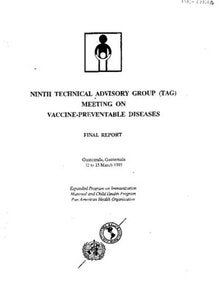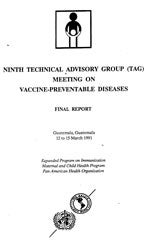Read complete TAG report for 1991

|
During 1990-1991, ongoing hepatitis B vaccination programs have been continued and amplified in Colombia, Brazil and Venezuela. In addition, vaccination programs have been initiated in several high hepatitis B virus endemic areas in Peru, and prenatal screening of pregnant women with vaccination of children born to hepatitis B virus carrier Mathers has been started in Cuba and Honduras. The needs to increase the availability of hepatitis serologic testing and improbé hepatitis surveillance in order to distinguish various types of acute hepatitis and determine causes of chronic liver disease, were reviewed. 
The cost of hepatitis B vaccine remains very high compared to the costs of other vaccines. Considering the known magnitude of hepatitis B problem, its use cannot presently be recommended except in selected areas of the few countries which now experience high endemicity. In such areas, efforts should be made to integrate hepatitis B vaccine into the EPI program. In other areas, vaccination of Elath care workers should be encouraged. To assist in better definition of problem areas, epidemiological, including serological surveys are warranted. Meanwhile, all possible efforts should be made through UNICEF and other procurement agencies to obtain vaccine at a substantially lower cost. The extent of recommended future use will be inversely related to vaccine cost. |
